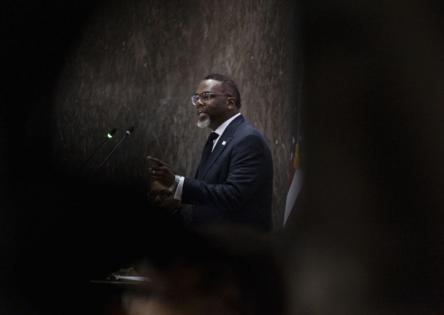Editorial: Mayor Brandon Johnson's claim that his head tax affects 3% of Chicago companies is disingenuous
Published in Op Eds
In defending his highly controversial proposal to impose a $21-per-month tax on the number of people big companies employ in Chicago, Mayor Brandon Johnson likes to emphasize that the 100-employee threshold he is supporting confines the tax to a small fraction of the private-sector employers operating in the city.
Johnson told reporters last week, “We’re talking about 3% of companies who will be asked to put more skin in the game; 97% of businesses won’t be impacted by this.”
That assertion is misleading on a number of levels.
The most basic of those levels is that it is in the city’s interest to encourage at least some of those 97% of “unaffected” businesses to grow to the point where they’re providing jobs to at least 100 people in Chicago. This tax would do precisely the opposite: it would be a meaningful disincentive to urging existing employers to expand operations in the city. Hit 100 staffers and you become a fat-cat corporation to Johnson.
But that’s hardly the whole problem here. The “3%” claim is highly misleading.
Ald. Bill Conway, 34th, points out that the Johnson administration’s projections that the $252-a-year head tax will generate $100 million in revenue for the city assumes that the tax will affect 396,825 jobs in the city. (Simple math).
The state’s most recent report on employment in the six-county Chicago area, released in December 2024, said there were a little over 1.2 million private-sector jobs in Chicago. So, this tax would affect companies employing fully one-third of people holding private-sector jobs in the city.
33% is a far cry from 3%.
And it demonstrates just how dependent Chicago’s economic health is on those big employers Johnson disdains as examples of the “ultra-rich.”
The double-edged sword of imposing such a high per-worker tax on this narrow — but highly impactful — slice of Chicago’s business community is that it would take just a few of those affected companies to move their operations out of the city to reduce that $100 million haul significantly.
Don’t think that’s likely? A rare op-ed in Thursday’s Tribune by McDonald’s Global Chief Impact Officer Jon Banner described the level of taxation the Johnson administration has proposed as “punitive” and said the measures have come after no consultation with corporate Chicago. “Ultimately, corporations have a choice of where they are headquartered,” Banner pointedly wrote.
It was just seven years ago that McDonald’s moved its headquarters to Chicago from its longtime base in west suburban Oak Brook, bringing more than 2,000 jobs to the city. McDonald’s says it supports more than 67,000 jobs in Illinois.
Johnson and the progressive aldermen supporting his draconian business taxes will reveal their naivete if they think similar conversations aren’t occurring in corporate offices throughout the city.
Of course, this is the same mayor’s office that defended its approach by posting the following on X on Tuesday: The proposed head tax “is the equivalent of large companies buying their employees lunch once per month.”
That is an odd defense when corporate workers generally buy their own lunches virtually all the time, as anyone who’s spent any time working in the private sector knows. (Johnson, it might be mentioned here, hasn’t worked in the private sector at all.) And eateries throughout the city depend on those workers who buy their own lunches for a significant chunk of their business.
If large employers decide Chicago under Johnson is an unfriendly environment for them and pull up stakes, guess who else (other than the mayor and his allies) will lose out? Among others, it will be those restaurants that feed those workers at lunchtime.
You know, the businesses that Johnson has said won’t be affected at all by this tax.
_____
©2025 Chicago Tribune. Visit at chicagotribune.com. Distributed by Tribune Content Agency, LLC.
























































Comments